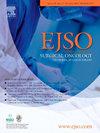经肛门、机器人、开腹和腹腔镜直肠癌切除手术的组织病理学结果。随机对照试验的贝叶斯网络荟萃分析。
IF 2.9
2区 医学
Q2 ONCOLOGY
引用次数: 0
摘要
背景:尽管全直肠系膜切除术是直肠癌的金标准,但采用哪种最佳手术方法可获得充分的肿瘤学结果仍存在争议。本网络荟萃分析旨在比较机器人(R-RR)、经肛门(Ta-RR)、腹腔镜(L-RR)和开腹(O-RR)直肠癌切除术的组织病理学结果:筛选了从开始到 2024 年 6 月的 MEDLINE、Embase 和 Cochrane 图书馆。在筛选出的 4186 篇文章中,选出了 27 篇 RCT。采用随机效应模型进行配对比较和贝叶斯网络荟萃分析:结果:27 项研究性临床试验共纳入 8696 名患者。贝叶斯配对荟萃分析显示,与腹腔镜相比,Ta-RR(Odds Ratio,OR,0.60;95%CI,0.33,0.92;P = .02;I2:11.7%)和 R-RR(OR,0.68;95%CI,0.46,0.94;P = .02;I2:41.7%)的非完全直肠系膜切除几率明显较低。此外,Ta-RR 组出现 CRM 阳性的几率低于 L-RR 组(OR,0.36;95%CI,0.13,0.91;P = .02;I2:43.9%)。与 L-RR 相比,R-RR 与收获更多淋巴结有关(平均差,MD,1.24;95%CI,0.10,2.52;P = .03;I2:77.3%)。相反,与所有其他方法相比,Ta-RR 的淋巴结切除数量明显较少。SUCRA图显示,Ta-RR是实现完全直肠系膜切除和阴性CRM的最佳方法,概率最高,其次是R-RR,在淋巴结取材方面排名第一:结论:在比较现有直肠癌切除手术方法的有效性时,Ta-RR和R-RR的组织病理学结果优于L-RR。本文章由计算机程序翻译,如有差异,请以英文原文为准。
Histopathological outcomes of transanal, robotic, open, and laparoscopic surgery for rectal cancer resection. A Bayesian network meta-analysis of randomized controlled trials
Background
While total mesorectal excision is the gold standard for rectal cancer, the optimal surgical approach to achieve adequate oncological outcomes remains controversial. This network meta-analysis aims to compare the histopathological outcomes of robotic (R-RR), transanal (Ta-RR), laparoscopic (L-RR), and open (O-RR) resections for rectal cancer.
Materials and methods
MEDLINE, Embase, and the Cochrane Library were screened from inception to June 2024. Of the 4186 articles screened, 27 RCTs were selected. Pairwise comparisons and Bayesian network meta-analyses applying random effects models were performed.
Results
The 27 RCTs included a total of 8696 patients. Bayesian pairwise meta-analysis revealed significantly lower odds of non-complete mesorectal excision with Ta-RR (Odds Ratio, OR, 0.60; 95%CI, 0.33, 0.92; P = .02; I2:11.7 %) and R-RR (OR, 0.68; 95%CI, 0.46, 0.94; P = .02; I2:41.7 %) compared with laparoscopy. Moreover, lower odds of positive CRMs were observed in the Ta-RR group than in the L-RR group (OR, 0.36; 95%CI, 0.13, 0.91; P = .02; I2:43.9 %). The R-RR was associated with more lymph nodes harvested compared with L-RR (Mean Difference, MD, 1.24; 95%CI, 0.10, 2.52; P = .03; I2:77.3 %). Conversely, Ta-RR was associated with a significantly lower number of lymph nodes harvested compared with all other approaches. SUCRA plots revealed that Ta-RR had the highest probability of being the best approach to achieve a complete mesorectal excision and negative CRM, followed by R-RR, which ranked the best in lymph nodes retrieved.
Conclusion
When comparing the effectiveness of the available surgical approaches for rectal cancer resection, Ta-RR and R-RR are associated with better histopathological outcomes than L-RR.
求助全文
通过发布文献求助,成功后即可免费获取论文全文。
去求助
来源期刊

Ejso
医学-外科
CiteScore
6.40
自引率
2.60%
发文量
1148
审稿时长
41 days
期刊介绍:
JSO - European Journal of Surgical Oncology ("the Journal of Cancer Surgery") is the Official Journal of the European Society of Surgical Oncology and BASO ~ the Association for Cancer Surgery.
The EJSO aims to advance surgical oncology research and practice through the publication of original research articles, review articles, editorials, debates and correspondence.
 求助内容:
求助内容: 应助结果提醒方式:
应助结果提醒方式:


